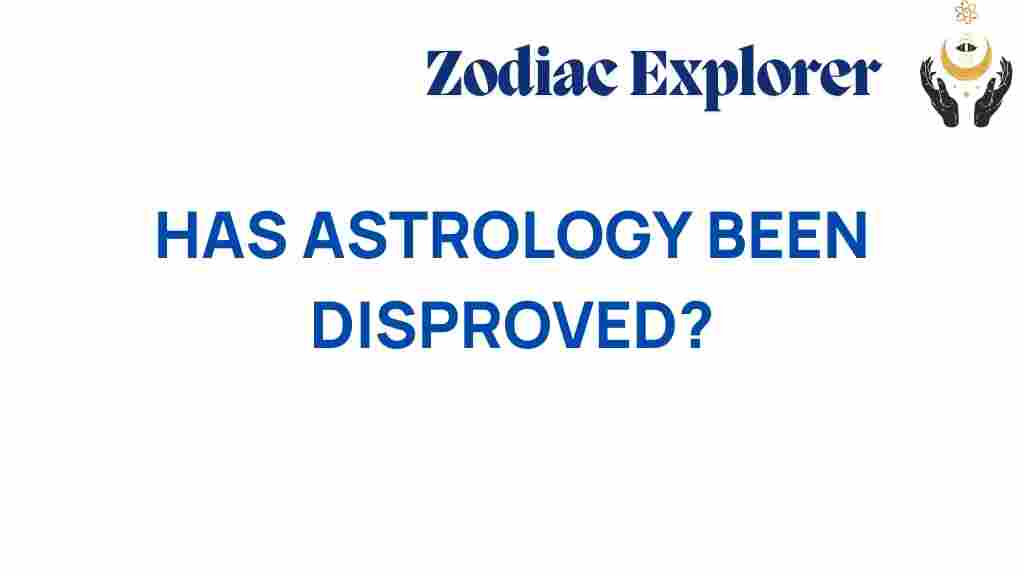Has Astrology Been Disproved? Unraveling the Cosmic Debate
Astrology, a belief system that suggests a relationship between the positions of celestial bodies and events on Earth, has been a subject of fascination and skepticism for centuries. While many people find comfort and insight in their horoscopes, others question the scientific validity of astrology. This article will delve into the question: has astrology been disproved? We will explore the concepts of astrology, science, belief systems, skepticism, and the cultural significance of horoscopes, while examining the cosmic debate surrounding astrology and its empirical evidence.
Understanding Astrology
Astrology is rooted in the idea that the positions and movements of celestial bodies, such as planets and stars, can influence human affairs and natural phenomena. It has been practiced in various forms across different cultures, from ancient Babylon to modern Western astrology. At its core, astrology seeks to provide insights into personality traits, life events, and relationships based on the positioning of celestial bodies at the time of an individual’s birth.
The Science of Astrology
When discussing astrology, it is crucial to differentiate between astrology as a belief system and the scientific perspective. Science relies on empirical evidence and reproducibility, while astrology is often based on anecdotal experiences and interpretations. Some of the key points in the debate between astrology and science include:
- Empirical Evidence: Scientific inquiries require testable and falsifiable hypotheses. Astrology has not provided consistent empirical evidence to support its claims.
- Reproducibility: Scientific findings must be reproducible. Astrological predictions are often vague and subjective, making them difficult to reproduce accurately.
- Correlation vs. Causation: Critics argue that any correlations observed between astrology and personality or life events are coincidental and do not imply causation.
The Skeptic’s Perspective
One of the strongest arguments against astrology comes from skepticism. Skeptics argue that astrology is a pseudoscience, lacking the rigorous methodologies that define scientific inquiry. Some common skeptical viewpoints include:
- Confirmation Bias: People are more likely to remember instances where astrological predictions were accurate while forgetting those that were not.
- The Barnum Effect: General statements can apply to anyone, leading individuals to believe that specific predictions are tailored to them.
- Lack of Mechanism: There is no scientific explanation for how celestial bodies could influence individual lives.
The Cultural Significance of Astrology
Despite the skepticism surrounding astrology, it holds considerable cultural significance in many societies. Here are some aspects of its importance:
- Historical Context: Astrology has been intertwined with various cultures, influencing art, literature, and philosophy throughout history.
- Community and Identity: Many individuals find a sense of belonging in astrological communities, sharing experiences and insights based on their signs.
- Personal Reflection: For some, astrology serves as a tool for self-reflection, providing a framework to understand personal challenges and strengths.
Astrology Proof: Can It Be Tested?
One of the most contentious aspects of the cosmic debate is whether astrology can be proven or disproven. Researchers have conducted various studies attempting to test astrological claims. A few notable studies include:
- Double-Blind Studies: Some studies have tried to match astrological profiles with actual personalities without the participants knowing their astrological signs. Results have often shown no significant correlation.
- Statistical Analysis: Large datasets have been analyzed to find patterns between astrological signs and life outcomes, but results tend to be inconclusive.
- Astrology vs. Random Chance: Critics argue that any perceived accuracy in astrology can often be attributed to random chance rather than astrological influences.
Step-by-Step Analysis of Astrology’s Claims
To further understand the debate, we can break down the claims of astrology into a step-by-step analysis:
- Claim Verification: Identify specific claims made by astrologers regarding personality traits or life events linked to astrological signs.
- Data Collection: Gather data from a diverse group of individuals, noting their astrological signs, life events, and personal traits.
- Statistical Testing: Apply statistical methods to analyze whether there are significant correlations between astrological signs and the traits or events in question.
- Peer Review: Ensure that findings are subject to peer review to validate the methodology and conclusions reached.
Troubleshooting Common Misconceptions
Throughout the cosmic debate, several misconceptions about astrology persist. Here are some common ones and how to address them:
- Misconception: Astrology is the same as astronomy.
Fact: Astronomy is a scientific discipline that studies celestial bodies, while astrology is a belief system based on interpreting those bodies’ influence on human affairs. - Misconception: All horoscopes are accurate.
Fact: Horoscopes are often generalized and can apply to many people, leading to a false sense of accuracy. - Misconception: Astrology can predict the future with certainty.
Fact: Astrology may offer insights or guidance, but it does not provide definitive predictions.
Conclusion: The Ongoing Cosmic Debate
In conclusion, the question of whether astrology has been disproved remains a complex topic. While scientific scrutiny has highlighted the lack of empirical evidence supporting astrological claims, the cultural significance of astrology persists. Many individuals find personal meaning and community in their belief in astrology, despite skepticism from the scientific community.
Ultimately, the cosmic debate between astrology and science invites ongoing discussion about belief systems, skepticism, and the human desire to understand our place in the universe. Whether one views astrology as a legitimate practice or a pseudoscience, its impact on culture and individual lives is undeniable.
For those interested in exploring more about the intersection of astrology and science, you can read an in-depth analysis here. Additionally, for further insights into various belief systems and their cultural significance, check out this resource here.
This article is in the category Myths and created by ZodiacExplorer Team
